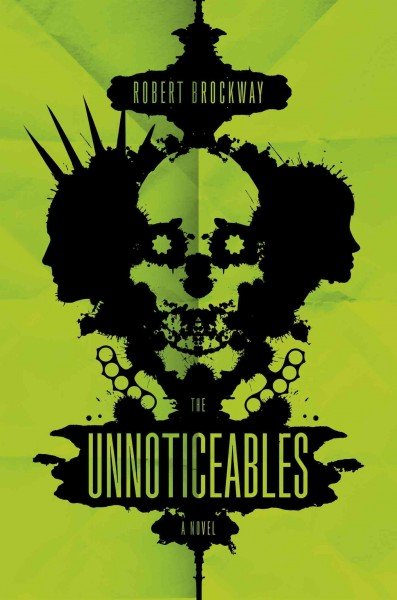There’s a story about the punk movement that goes like this:
Someone asked me “what is punk?” so I kicked over a garbage can.He kicked over another garbage can and asked, “so that’s punk?”“No,” I said. “That’s just trendy.”
That’s pretty much what you need to know to start reading The Unnoticeables by Robert Brockway, set on the New York punk scene in the 70’s. Carey, the protagonist punk despite his best efforts to be more of an antagonist, is living in the splendid squalor that befits one of his station. He’s an ass, plain and simple, but he’s also rather self-aware, which makes him likable. He calls bullshit on himself as much as he does on his dubious batch of friends and the “parasites,” younger hangers-on who want to bask in his cool. He’s content to go to shows, drink terrible beer, and chase tail, but unfortunately for him, the world has decided to turn around and extend him the middle finger he has been giving it for years.
 This rudeness takes the form of a “tar man,” a monstrosity of oozing malevolence that consumes one of his friends. Carey begins to learn that there are more of these things, as well as more varieties, and they’re the ones behind the disappearances that have been plaguing the scene. The only problem is, they’re hard to notice. Gigantic, gear-eyed, anthropoid piles of toxic sludge are hard to notice? Well, yes. They’re accompanied by other monsters that look completely average until they attack–so average, in fact, that no one except a few beat-up punks even bother to look at them.
This rudeness takes the form of a “tar man,” a monstrosity of oozing malevolence that consumes one of his friends. Carey begins to learn that there are more of these things, as well as more varieties, and they’re the ones behind the disappearances that have been plaguing the scene. The only problem is, they’re hard to notice. Gigantic, gear-eyed, anthropoid piles of toxic sludge are hard to notice? Well, yes. They’re accompanied by other monsters that look completely average until they attack–so average, in fact, that no one except a few beat-up punks even bother to look at them.
And then there’s also Kaitlyn, a waitress and occasional stuntwoman working in LA and doing her best to avoid both buried memories and industry phonies. Obviously, both of these things are difficult. Making it more difficult still is another Unnoticeable who shows up outside her window and reveals yet another form, the tar melting off into a sphere of unearthly light, and a sound “…like a thousand beautiful voices singing to drown out a million more screaming.”
Sound freaky? Yeah, it is. This book is a thanksgiving cornucopia of freakishness, and I love it. It’s crude and clever and both the narrators are enormously fun. They’re also freaks of a different stripe–a woman who doesn’t want to be a movie star is living in LA, a man who doesn’t want to give a damn is trying to save the world. They work crap jobs or not at all, they stutter on the edge of ruin, and they’re happy. Maybe not happy-go-lucky, but the have lives and they feel them deeply, and they don’t go through pages and pages of hand-wringing like so many characters I feel like I’ve been seeing lately.
This stands in direct contrast to the antagonists, the so-called angels and tar-men and Unnoticeables, who want to reduce “redundancies” in the universe. That’s a nice, mathematical way of saying that they kill people they consider underproductive. Feeling has nothing to do with it. The universe is a soulless–dare I say corporate?–machine, and they’re the suits who don’t realize that life is about more than efficiencies. Sometimes it’s about high-speed motorcycle chases and drop-kicking someone you have no chance of beating, just because you can.
It’s a slick commentary on two very different worlds, the punk scene and the movie industry, which I would never have imagined putting together. There is a great deal of nihilism in both, though I would argue that the punk scene brings it on by choice. And though the conclusion is expected–that humans are irreducible–Brockway relies on drunken freeloaders and out-of-work adrenaline junkies to make the point, rather than precocious teenagers or otherwise Chosen Ones of Art and Magic. It’s a really new and satisfying avenue to explore.
The only issue is the ultimate purpose of the many monsters. Brockway does a good job of maintaining both context and tone in his explanations, making sure that characters don’t know or conclude more than they should. However, this makes it difficult to get a full understanding of the purposes. There is in particular a ritual of–reproduction? And a defense of–madness? It makes a certain kind of narrative sense, but I would be hard pressed to say exactly what the bad guys are trying to accomplish or how a deeply weird bunch of murders aid them.
I don’t mind ambiguity, especially when the plot still manages to resolve coherently and satisfyingly. But a bit of research unearths that this is meant to be a trilogy, which does give me some hope of a fuller picture emerging. I do hope that we get to revisit Kaitlyn and Carey especially, two incredibly unexpected and thoroughly entertaining characters with more guts than good sense. But no matter who shows up or what goes down, we’re in good hands with Robert Brockway, who is very Punk Rock indeed.
A final note, because I am a geek and this is Geekly: one does not play Mario on one’s phone (page 130). Nintendo is in the process of making games for smartphone platforms, but they’re not there yet. But hey, maybe that’s just trendy.
